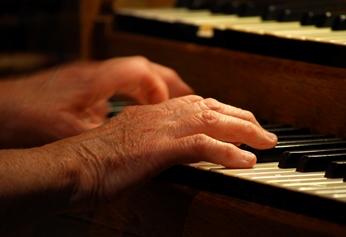The EFC is inviting Canadians to share Your Stories of Palliative Care, as we launch the Palliative Care Toolkit, a resource to encourage discussion and help equip Canadians in dealing with serious illness. Contact us to submit your palliative care story. We would be honoured to hear it and share it.
By Bev Foster
 A lot of life happens in rooms, and so does a lot of death. One room I will always remember is Room 217, where my mom, five siblings and I sang around my dad’s bedside as he was dying in a hospital northeast of Toronto. Whether it was the lingering words, simple melodies or our faltering voices, what was undeniable was the calming and soothing assurance our music had on my dad in this sacred space.
A lot of life happens in rooms, and so does a lot of death. One room I will always remember is Room 217, where my mom, five siblings and I sang around my dad’s bedside as he was dying in a hospital northeast of Toronto. Whether it was the lingering words, simple melodies or our faltering voices, what was undeniable was the calming and soothing assurance our music had on my dad in this sacred space.
I was close to my dad, and one thing that drew us together was our love for music. When I was growing up, my Sunday afternoon pastime was playing hymns with him. He would be at the organ and I would be at the piano. When Dad had his first and second quadruple bypasses, it was no wonder music played a role in his recovery. The tunes that lived in Dad’s spirit energized him and gave him new tomorrows. The diagnosis of a stage 4 terminal illness several years later was as unexpected as a snowfall in July.
I watched Dad’s bottom line change dramatically. His attentiveness to profit and loss, pro quotas, distribution strategies and board meetings was lamentably replaced by blood tests, cat scans, antibiotic pics and a maze of healthcare infrastructure. That summer, everything that could go wrong did.
There was a morning in August I remember like it was yesterday. He sat in the rocking chair already battle-worn. I sat on his organ bench experiencing the waves of grief that strike as surreptitiously as a tsunami. Intuitively, we knew our exchange would be around those hymns we had played for years. Our tears sang the words that day, yet as the music played, sounds of hope filled the air.
The notion of death and dying is something I haven’t been afraid to talk about. I believe death is a transition, not a destination. I had always thought that sudden death was preferable. But now I was seeing firsthand that terminal illness had tremendous opportunity for connecting, caring and completion.
The last hours with Dad are still etched in my heart. Although he was subcutaneously morphined, Dad tried to sing along. I’d never heard a sound like it: neither guttural or diaphragmatic. It came from a different place; think it was a place deep in his soul. I saw with my own eyes and experienced with my own heart how music was a companion to Dad in his final transition. It was a gift, wrapped with the ribbon of release.
Music had been my way of connecting with Dad in life, and it became my way of supporting him at poignant moments during his illness and final hours. Today, when I hear the hymns that were like cherished friends to Dad, I am connected to his memory, those final moments and the anticipation of things to come.
Have you witnessed the difference palliative care made for a loved one? If you have an experience that you’d be willing to share on the EFC’s platform, email us to tell us about it. To say thank you, we’ll give you a free one-year subscription to Faith Today, Canada’s Christian magazine, where subscribers can read stories like this recent feature on palliative care.